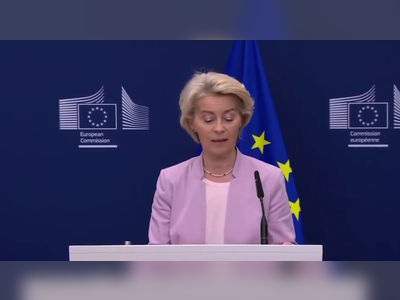Are AI Data Centres the Infrastructure of the Future or the Next Crisis?
US tech giants invest record sums in AI data centres, with financing increasingly dependent on private credit and shadow banks, raising concerns over systemic financial risks.
As the US economy signals a slowdown, with weaker hiring and a sharp rise in bond yields, one sector continues to break records: artificial intelligence infrastructure.
Technology giants including Microsoft, Meta, Amazon, and Google are now investing more than a third of their revenues in building data centres to meet the vast demand for computing power for advanced models such as OpenAI’s GPT-4 and Meta’s Llama 3.
Investment has already moved beyond the training of models and is focused on inference, the stage of deployment that consumes most processing resources.
According to recent figures, the seven largest technology companies invested $102.5 billion in capital expenditures in recent quarters, of which around ninety-five percent was dedicated to AI and cloud projects.
This rate of investment has surpassed the peaks recorded during the dot-com and telecom infrastructure booms of the 1990s.
Research by Renaissance Macro indicates that AI investments have recently contributed more to US GDP growth than private consumption, an unusual development in an economy historically driven by consumer spending.
To finance this race, many companies are turning to external credit sources: private debt funds, asset-backed securities, leases, and bond offerings.
The volume of debt raised by technology firms surged by seventy percent in the first half of 2025 compared to the same period in 2024.
Meta alone is currently negotiating to raise approximately $30 billion.
Some lenders, including the funds themselves, are leveraged and rely on credit from banks or insurance companies.
If revenue projections fall short, the damage may not remain confined to Silicon Valley but could spread throughout the financial system.
The major concern is not necessarily a collapse in the value of technology stocks, a scenario familiar from the past, but the identity of the institutions financing the current boom.
While private investors may simply lose money, the risk is greater when core institutions such as banks, insurers, and pension funds are involved.
At the centre of the financing stand private debt funds, also known as shadow banks—financial institutions that are not regulated like commercial banks but borrow from them and pass the money on as loans, often leveraged, to technology companies and data-centre projects.
Funds such as Carlyle, Apollo, and Brookfield are already injecting tens of billions of dollars into debt-backed ventures, including companies like CoreWeave, which leases server-farm capacity to major technology firms, and to Meta itself.
This growth is no coincidence.
Since the subprime crisis, commercial banks have been subject to tighter regulation, limiting their ability to expand credit freely.
At the same time, large institutional investors, including some from Israel, began channeling money into private debt funds in search of higher-yielding assets.
These funds have grown into financial giants and today are among the central players in financing AI infrastructure.
Another problem lies in the structure of these funds.
Many operate as closed-end funds, meaning they have a limited lifespan.
At the end of the period, they must return money to investors.
If debts are not repaid on time, the fund may be forced to sell assets under market pressure, potentially triggering a sudden credit crunch and simultaneous declines in the value of financial assets.
Insurance companies are also emerging as prominent players in financing AI infrastructure.
According to research by the Federal Reserve Bank of Boston, the proportion of speculative debt in the investment portfolios of life insurers is already higher than before the 2008 subprime crisis.
Much of this investment flows into private credit funds, which then channel the money into technology projects.
Banks too have deepened their involvement.
According to Federal Reserve data, since 2013 the share of bank loans to private debt funds has risen from one percent to fourteen percent.
Although this growth is proportional to the market’s expansion, questions remain: the exposure is not diversified but concentrated almost entirely in data centres—a new and volatile sector driven largely by technological optimism.
Even a modest deviation from forecasts, a slowdown in model adoption, a technological breakthrough that reduces energy consumption, or a fall in the market price of server farms could erode cash flow, lead to credit-rating downgrades, and trigger defaults.
In a leveraged market with strict fund redemption timelines, the effect could be systemic.
It is no coincidence that market participants often cite the words of JPMorgan’s CEO Jamie Dimon, who has repeated over the years: “When the music is playing, everyone gets up to dance.
But maybe it’s time to consider turning off the speakers.”
Regulators are aware of the risk and are calling for increased oversight.
Not every economic bubble leads to systemic collapse.
During the dot-com bubble of the early 2000s, which saw hundreds of companies fail and mass layoffs, the financial system remained intact largely because banks were not deeply leveraged.
Today, too, there are milder scenarios: technology giants generate positive cash flow that allows them to finance part of their investments independently.
Not all debt funds are equally leveraged, and if bank exposure remains limited, the outcome could be a painful correction rather than a full-scale financial earthquake.
Nevertheless, even in an intermediate scenario, declines in valuations, project slowdowns, and potential hits to institutional returns, including pension funds, are expected.
Regulators are already focusing on this market: over the past year, the Federal Reserve has published a series of position papers warning about the sharp rise in debt financing data centres and calling for greater supervision and transparency.
The open question remains: are artificial intelligence infrastructures truly the growth engine of the coming decade, or the foundation of the next financial crisis?
As economist Noah Smith has written in his popular blog, there is a real possibility that the data-centre sector could develop into a broad economic crisis because “the AI boom is real.
The challenge for the financial system is not to make it dangerous.”
Technology giants including Microsoft, Meta, Amazon, and Google are now investing more than a third of their revenues in building data centres to meet the vast demand for computing power for advanced models such as OpenAI’s GPT-4 and Meta’s Llama 3.
Investment has already moved beyond the training of models and is focused on inference, the stage of deployment that consumes most processing resources.
According to recent figures, the seven largest technology companies invested $102.5 billion in capital expenditures in recent quarters, of which around ninety-five percent was dedicated to AI and cloud projects.
This rate of investment has surpassed the peaks recorded during the dot-com and telecom infrastructure booms of the 1990s.
Research by Renaissance Macro indicates that AI investments have recently contributed more to US GDP growth than private consumption, an unusual development in an economy historically driven by consumer spending.
To finance this race, many companies are turning to external credit sources: private debt funds, asset-backed securities, leases, and bond offerings.
The volume of debt raised by technology firms surged by seventy percent in the first half of 2025 compared to the same period in 2024.
Meta alone is currently negotiating to raise approximately $30 billion.
Some lenders, including the funds themselves, are leveraged and rely on credit from banks or insurance companies.
If revenue projections fall short, the damage may not remain confined to Silicon Valley but could spread throughout the financial system.
The major concern is not necessarily a collapse in the value of technology stocks, a scenario familiar from the past, but the identity of the institutions financing the current boom.
While private investors may simply lose money, the risk is greater when core institutions such as banks, insurers, and pension funds are involved.
At the centre of the financing stand private debt funds, also known as shadow banks—financial institutions that are not regulated like commercial banks but borrow from them and pass the money on as loans, often leveraged, to technology companies and data-centre projects.
Funds such as Carlyle, Apollo, and Brookfield are already injecting tens of billions of dollars into debt-backed ventures, including companies like CoreWeave, which leases server-farm capacity to major technology firms, and to Meta itself.
This growth is no coincidence.
Since the subprime crisis, commercial banks have been subject to tighter regulation, limiting their ability to expand credit freely.
At the same time, large institutional investors, including some from Israel, began channeling money into private debt funds in search of higher-yielding assets.
These funds have grown into financial giants and today are among the central players in financing AI infrastructure.
Another problem lies in the structure of these funds.
Many operate as closed-end funds, meaning they have a limited lifespan.
At the end of the period, they must return money to investors.
If debts are not repaid on time, the fund may be forced to sell assets under market pressure, potentially triggering a sudden credit crunch and simultaneous declines in the value of financial assets.
Insurance companies are also emerging as prominent players in financing AI infrastructure.
According to research by the Federal Reserve Bank of Boston, the proportion of speculative debt in the investment portfolios of life insurers is already higher than before the 2008 subprime crisis.
Much of this investment flows into private credit funds, which then channel the money into technology projects.
Banks too have deepened their involvement.
According to Federal Reserve data, since 2013 the share of bank loans to private debt funds has risen from one percent to fourteen percent.
Although this growth is proportional to the market’s expansion, questions remain: the exposure is not diversified but concentrated almost entirely in data centres—a new and volatile sector driven largely by technological optimism.
Even a modest deviation from forecasts, a slowdown in model adoption, a technological breakthrough that reduces energy consumption, or a fall in the market price of server farms could erode cash flow, lead to credit-rating downgrades, and trigger defaults.
In a leveraged market with strict fund redemption timelines, the effect could be systemic.
It is no coincidence that market participants often cite the words of JPMorgan’s CEO Jamie Dimon, who has repeated over the years: “When the music is playing, everyone gets up to dance.
But maybe it’s time to consider turning off the speakers.”
Regulators are aware of the risk and are calling for increased oversight.
Not every economic bubble leads to systemic collapse.
During the dot-com bubble of the early 2000s, which saw hundreds of companies fail and mass layoffs, the financial system remained intact largely because banks were not deeply leveraged.
Today, too, there are milder scenarios: technology giants generate positive cash flow that allows them to finance part of their investments independently.
Not all debt funds are equally leveraged, and if bank exposure remains limited, the outcome could be a painful correction rather than a full-scale financial earthquake.
Nevertheless, even in an intermediate scenario, declines in valuations, project slowdowns, and potential hits to institutional returns, including pension funds, are expected.
Regulators are already focusing on this market: over the past year, the Federal Reserve has published a series of position papers warning about the sharp rise in debt financing data centres and calling for greater supervision and transparency.
The open question remains: are artificial intelligence infrastructures truly the growth engine of the coming decade, or the foundation of the next financial crisis?
As economist Noah Smith has written in his popular blog, there is a real possibility that the data-centre sector could develop into a broad economic crisis because “the AI boom is real.
The challenge for the financial system is not to make it dangerous.”
AI Disclaimer: An advanced artificial intelligence (AI) system generated the content of this page on its own. This innovative technology conducts extensive research from a variety of reliable sources, performs rigorous fact-checking and verification, cleans up and balances biased or manipulated content, and presents a minimal factual summary that is just enough yet essential for you to function as an informed and educated citizen. Please keep in mind, however, that this system is an evolving technology, and as a result, the article may contain accidental inaccuracies or errors. We urge you to help us improve our site by reporting any inaccuracies you find using the "Contact Us" link at the bottom of this page. Your helpful feedback helps us improve our system and deliver more precise content. When you find an article of interest here, please look for the full and extensive coverage of this topic in traditional news sources, as they are written by professional journalists that we try to support, not replace. We appreciate your understanding and assistance.










